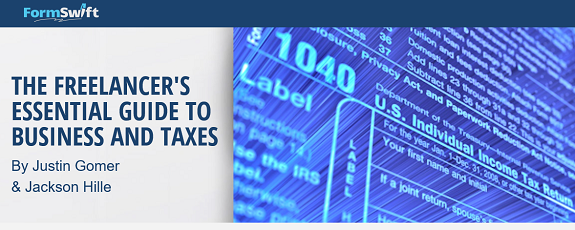To help new freelancers understand some of the paperwork associated with freelance business operations, FormSwift has published “The Freelancer’s Essential Guide to Business and Taxes.” Written by Justin Gomer and Jackson Hille, the guide urges new solopreneurs to take a business-like approach to their freelance business.
Learn to Prosper in the Gig Economy
While many photographers, designers, and writers are accustomed to deriving some or all of their income from freelancing, many other professionals aren’t. But millions of new college graduates, part-time employees, under-employed professionals, and displaced workers are actively pursuing freelance gigs.
In fact, a whole new “Gig Economy” has taken shape in the aftermath of the Great Recession of 2008-2009. As Gerald Friedman pointed out on his Dollars and Sense blog, “Growing numbers of Americans no longer hold a regular ‘job’ with long-term connection to a particular business. Instead, they work “gigs,” where they are employed on a particular task or for a defined time…Borrowed from the music industry the word ‘gig’ is now applied to all sorts of flexible employment.”
Freelancers and independent contractors today include adjunct and part-time professors, Uber and Lyft drivers, translators, virtual assistants, doctors, lawyers, and accountants.
“The Freelancer’s Essential Guide Business and Taxes” discusses the types of forms new freelancers need to file estimated taxes or report payments to independent contractors you might hire to help you complete an assignment.
The guide reassures Gig Economy newcomers that they aren’t alone. Resources such as the Freelancers Union can show you how to forge a successful career as an independent worker.
Is Freelancing the New Normal?
According to the study “Freelancing in America: A National Survey of the New Workforce,” 53 million Americans are now engaged in some form of supplemental, temporary, or project- or contract-based work. Technology has made it much easier for individuals to find freelance work and contribute work from wherever they choose to live.
The study lists five types of freelancers:
Independent contractor: Provides freelance, temporary, or supplemental work on a project-to-project basis.
Moonlighter: Uses freelance work to supplement income from a full-time job.
Diversified worker: Combines part-time jobs with freelance gigs.
Temporary worker: Works for a months-long project for single client.
Freelance business owner: Employs one to five people but regards himself or herself as both a freelancer and a business owner.
About FormSwift
FormSwift is an online platform that makes it easy to locate, edit, and electronically sign more than 500 commonly used business and legal forms.
In addition to tax forms for estimated taxes, you can find templates for small business documents, real-estate transactions, affidavits, and personal contracts (such as prenups and cohabitation agreements).
In the small-business category, you can download and edit templates for:
- non-disclosure agreements
- invoices
- consulting agreements
- employee handbooks
- independent contractor service agreements
- cease-and-desist letters for copyright infringement
FormSwift members can choose from 500+ document templates or upload their own documents and use FormSwift’s tools to edit them.
LINKS
The Freelancer’s Essential Guide to Business and Taxes
Freelancing in America: A National Survey of the New American Workforce

